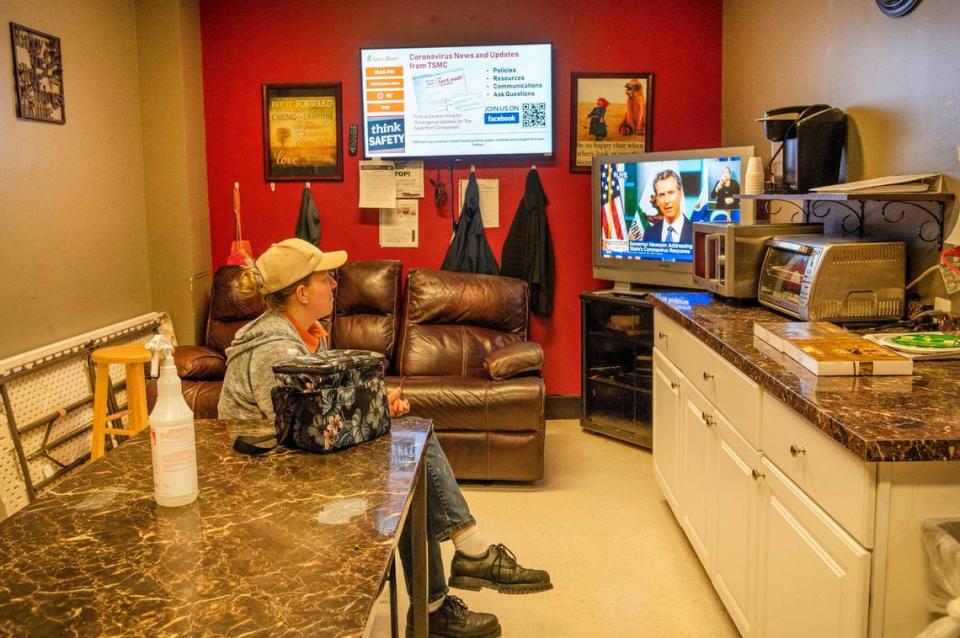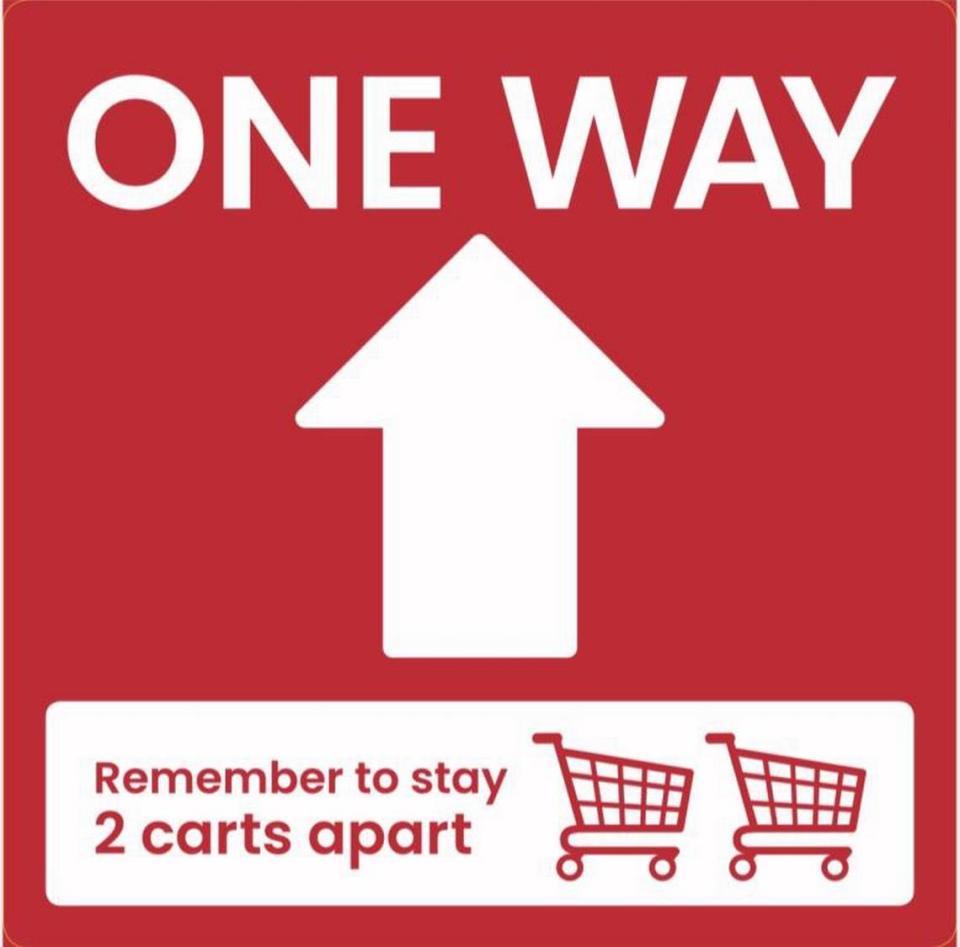Customers in masks. One-way aisles. Sacramento supermarkets ramp up coronavirus rules
Three Raley’s employees, all wearing masks, were chatting near the floral department at the store on Freeport Boulevard on Tuesday when they spotted a problem: A co-worker was supervising the self-serve checkout aisle without a mask.
An employee jogged over to the offender, handed her a mask and helped her put it on. Mission accomplished.
Oh, how things have changed in the supermarket business.
Until just a few days ago, the grocery store seemed like one of the last normal places left in the coronavirus age — deemed essential to society, open for business, a place where people could see their neighbors, even if they had to keep their distance. Relatively few shoppers wore masks. Except for the panic buying over paper products and sanitizers, a trip to the supermarket felt like a getaway of sorts, an island of relative calm in a world gripped by a pandemic.
Not so much anymore. Acrylic shields at the checkout stand are as commonplace as fresh strawberries. Customers seem to be getting more attentive about social distancing, following the floor markers at checkout lines spaced six feet apart. Many employees and customers are donning masks.
Stricter measures are coming. This week Safeway said it will place directional arrows in its aisles to encourage one-way traffic and reduce congestion. Nugget Markets is taking employees’ temperatures when they report to work and requiring them to wear masks. Starting next week Nugget will require customers to wear masks, too.
The changes come as public health officials, wary of an anticipated surge in COVID-19 cases in the coming weeks, are starting to discourage visits to the supermarket.
On Monday Los Angeles County’s public health director said residents should try to have food delivered instead. An even sterner warning came Saturday from Dr. Deborah Birx, the White House’s coronavirus response coordinator, who said: “This is the moment to not be going to the grocery store and not be going to the pharmacy.”
Customers aren’t necessarily heeding the advice. A spot check of Sacramento area supermarkets this week found shoppers still out in force.
“To me, this is essential,” said Eileen Peterson as she loaded groceries into her car at the Nugget Market in Sacramento’s Pocket neighborhood. “If we can eat as a family, that’s our one planned joy.”
That’s not to say Peterson was oblivious to the risks. She wore rubber gloves, used her scarf as a mask and disinfected her shopping cart with a spray solution she brought from home.
The store she had just patronized had changed, too. All employees were wearing masks — a requirement as of Tuesday morning, according to one worker. Employees get their temperatures taken at the start of their shifts, and anyone clocking in at 100 degrees or higher is sent home for at least three days, with pay.
A sign posted prominently at the main entrance read: “Refrain from visiting, socializing or lingering in the store. For everyone’s safety, shop alone, if possible.”
And beginning Monday, Nugget customers will have to wear masks or scarves covering their noses and mouths. “I know this might upset a few of you and I apologize in advance, but this will offer all of us the most protection!” the chain’s chief executive Eric Stille wrote in an email to customers Wednesday.

Sacramento shoppers: We can’t avoid supermarkets
Shoppers insisted they had little choice but to venture out, despite the White House’s warnings.
Nick McClara said his trip to the Safeway on Alhambra Boulevard Tuesday morning was his first time out of the house in three weeks. It was also his third stop at a supermarket of the day: McClara said his family qualifies for the federal government’s Special Supplemental Nutrition Program for Women, Infants and Children, or WIC, and the WIC program limits the types of foods he can buy. So he has to shop around.
McClara, who wore a mask, said he felt comfortable prowling the aisles at Safeway but would take extra precautionary steps once he got back home: He would immediately shower and toss his clothes into the washer, while his wife wiped down the boxes and jars of food with alcohol before storing them.
“We have a ‘better safe than sorry’ mentality,” he said.
At least he didn’t have to wait in line. The coronavirus has created rush hours at many stores, usually early in the evening or late at night. At the Alhambra Safeway, security guards flank the entrance and allow no more than 50 people inside at a time during the busiest times. A “senior hour” for at-risk shoppers has been carved out: 7 to 8 a.m. on Tuesdays and Thursdays.
One more change coming to Safeway: The chain is installing one-way directional decals in its aisles to encourage smoother flow and less congestion in the stores, said spokeswoman Wendy Gutshall. The process should be complete by the end of the week, she said.

Smaller stores have their own challenges with congestion. Even at mid-morning at Trader Joe’s in East Sacramento, shoppers were still lined up outside the building, standing in marked-off slots six feet apart as they waited for others to leave so they would be allowed inside.
Two masked employees were spraying and wiping carts and shopping baskets in view of everyone.
“Here there is discipline and mindfulness of social distance,” said customer Norma Andrade. She loves Costco, but said customers at Trader Joe’s seem more safety conscious.
Yet some customers have been put off by stores that ratchet up the precautions. Vicki Carlson, a retired nurse, was shopping Tuesday at nearby Corti Brothers supermarket because she felt more at ease there than with the more strict regimentation of the new routine at Trader Joe’s.
“I’m used to coming here; it’s comfortable,” she said of Corti Brothers, which has installed acrylic shields but hadn’t made many other significant changes. “Also, I want to support local businesses.”
Walmart: ‘Stay home’ if you’re sick
At the Walmart superstore in the Delta Shores shopping complex in south Sacramento, a pre-recorded safety message was repeated over the public address system every few minutes, urging customers to wash their hands and “stay home if you’re sick.”
The traditional “Walmart greeter” had been replaced by a masked employee, recording the number of shoppers coming and going on a tablet. The maximum allowed inside: 945.
Some employees wore masks and gloves, but many didn’t. An employee behind the deli counter wore a mask tucked under her chin.
Employees said the differences in the past few days are palpable. Deanna Glazer, who works at the Save Mart on Foothills Boulevard in Roseville, said management has stepped up the safety routine in the past week or so.
Every other cashier stand is closed, for instance, so cashiers don’t have to stand too close to each other. And employees are now encouraged to wear masks, said Glazer, a shop steward with UFCW8-Golden State, the United Food and Commercial Workers union.
Before, “the company was worried about perception,” Glazer said. “They didn’t want customers to think we’re sick.”
Victoria Castro, a spokeswoman for Save Mart, said: “From the beginning, we’ve allowed employees to wear masks.” The grocery chain has been supplying masks to workers when it’s able to get them, she said.
Raley’s spokeswoman Chelsea Minor said the chain hasn’t instituted any formal policies on masks but is having employees clean the store more rigorously, “especially on frequently touched hard surfaces.”
Customers are no longer allowed to bring their reusable grocery bags, she said. They either have to buy bags from the store at 10 cents apiece or have the checker place the groceries directly into the customer’s cart.
“They were doing what they needed to do,” said Corrine Harwood, who was finishing up her shopping at the Freeport Raley’s. “I felt safe. They were following the rules.”
It’s the final days for the Freeport store, considered the flagship of the chain. It’s due to give way April 15 to a new Raley’s a block away, the centerpiece of a shopping center the chain is developing.
The project is a major landmark for Raley’s, but the pomp and circumstance of opening day will have to wait a while.
“Given the realities of COVID-19, this opening will not include any traditional celebration,” Minor said. “But we do plan on properly celebrating with the community at a later date.”

